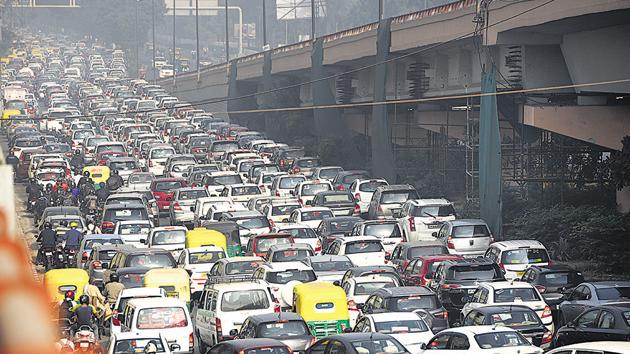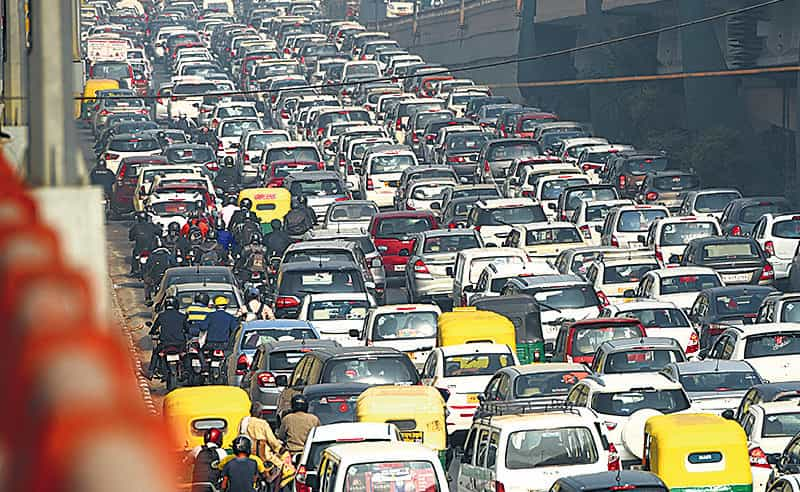Banning all non-CNG private vehicles in Delhi impractical, say experts
Environment activists punch hole in EPCA’s ‘blanket ban’ plan in Delhi. They say unlike Beijing and Paris, Delhi doesn’t have a robust transport network to fall back on and will come to a standstill.
Experts on Wednesday reiterated that a ban on all private vehicles that do not run on CNG, as being pushed for by the Supreme Court-appointed Environment Pollution (Prevention and Control) Authority (EPCA), would be ‘impractical’. They also doubted if the existing transport infrastructure could support the sudden increase in passengers.

As per the government’s planning department, Delhi has a population of about 2 crore people, excluding those who enter or cross the city on a daily basis from the neighbouring cities. Out of 1.12 crore registered vehicles in Delhi, 1.04 crore alone are private cars and motorcycles. If the ban is imposed, almost all of them will have to fall back on a public transport system comprising only 5,443 buses, a Metro network spanning 314km and a taxi fleet of about 1.5 lakh vehicles.
“Even on a normal day, Delhi’s public transport system fails to make daily commute easy for people. Even today, one has to wait anywhere between 15 minutes to an hour for a bus. Even for the police and other enforcing agencies, implementing this ban will be impossible. The city will come to a standstill,” said Sanjay Gupta, head of transport and planning department at the School of Planning and Architecture.
Many said allowing just CNG private vehicles, as planned by the EPCA, would hardly help the situation. Data with the transport department suggests that out of the 33 lakh registered private vehicles in Delhi, only 4.5 lakh run on CNG.
The EPCA in its letter to Central Pollution Control Board on Wednesday cited examples of Beijing and Paris that have enforced restrictions on private vehicles either according to number plate or by fuel type and age. But, all these cities have a robust transport network to fall back on. Beijing not only has five times the number of buses as compared to Delhi but its Metro network too is double the size of the Capital.
Amit Bhatt, director of integrated urban transport at World Resources Institute India said the measures to restrict car movement in these cities was after much planning and was not a “knee-jerk” reaction.
Transport experts also questioned why the EPCA was not pulling up the Delhi government for the sluggish implementation of the new mandatory stickers for vehicles that would help the traffic police segregate cars based on their fuel type. According to the Delhi government data, in a month, it has managed to disburse only around 28,000 such stickers.
Many cities in China use stickers to identify polluting vehicles on road and penalise car owners. “In Shenzhen, for example, the stickers or labels, as they call it, are based on the exhaust emission levels of vehicles. Vehicles failing to meet the standards are given a yellow label. The cars with yellow label are also not allowed to enter the ring roads that lead to the main city area,” said Bhatt said.

Road safety expert Dinesh Mohan, a former professor at IIT-Delhi, said such bans are “instant solutions” that are ‘undemocratic’ and ‘ineffective’ in the long run.
“We don’t need such solutions as we have been trying these for nearly 20 years. State governments and the Central government together should chalk out a detailed plan to curb pollution in the next five years. The plan should elaborate on measures that should be taken and explain how it will help in bringing down air pollution and by what percentage and have public hearings on the same,” Mohan said.
Experts in the transport planning department of SPA said the authorities instead need to introduce various mobility management measures, at least on a pilot basis. “Disincetivising single driven cars on selected corridors, introducing congestion charges, high parking fees, car-pooling and flexi work hours or staggered activity hours should be taken up rigourorsly,” they said.




